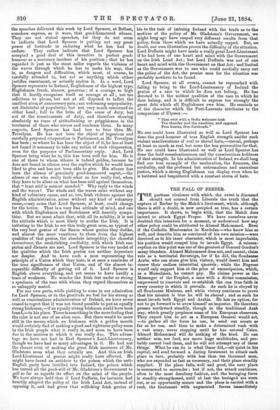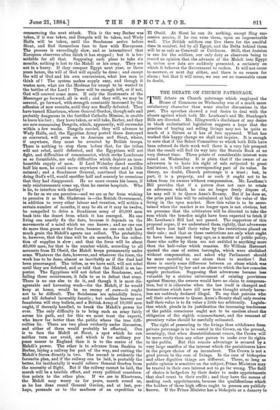THE FALL OF BERBER.
MHE partisan virulence with which the event is discussed
I should not conceal from Liberals the truth that the capture of Berber by the Mandi's lieutenant, which, although there is still a doubt, is now accepted as true, has a certain importance. It shows, to begin with, that the Mandi does intend to attack Egypt Proper. We have ourselves never doubted this intention for a moment, or understood how any other policy could be attributed to Ahmed Mahommed. Even if the Catholic Missionaries in Kordofan—who know him so well, and describe him as convinced of his own mission—were deceived as to his inner character, which is most improbable, his position would compel him to invade Egypt. A miscon- ception on this point was one of the greatest of General Gordon's many blunders. Ahmed Mahommed does not, and cannot, claim rule as a territorial Sovereign, for if he did, the Soudanese Arabs, who can alone give him victory, would desert him and renew their endless intertribal quarrels ; while the Negroes would only support him at the price of emancipation, which, as a Mussulman, he cannot pay. He claims power as the Messenger of the Prophet, a man with a divine commission, empowered to renovate and re-establish the one true faith in every country in which it prevails. As such he is obeyed by all Soudanese Moslems, and while victory continues to prove that his mission is tree he will be obeyed ; and as such he must invade both Egypt and Arabia. He has no option, for not to go forward is to avow himself an impostor. He therefore presses northward steadily, though in the traditional Arab way, which greatly perplexes some of his European observers. They expect him to act as a European General would act, —to gather all the force her can, to send out scouts as far as he- can, and then to make a determined rush with a vast army, never stopping until he has entered Cairo. Ahmed Mohammed will do nothing of the kind. He can neither arm, nor feed, nor move huge multitudes, and pro- bably cannot lead them,, and he will not attempt any of those things. What he can do is what Omar did,—sit quiet in his capital, and send forward a. daring lieutenant to attack each place in turn, probably with less than ten thousand men, who are expended as fast as necessary, and their place steadily supplied. If the place falls, well and good, the next place is summoned to surrender ; but if not, the attack continues, often in the most desultory fashion, and the besieging force is steadily strengthened, until at last the besieged are worn out, or an opportunity occurs and the place is carried with a rush, the lieutenant with augmented forces immediately
commencing the next attack. This is the way Berber was taken, if it was taken, and Dongola will be taken, and Wady Haifa will be taken, until the Soudanese arrive before Siout, and find themselves face to face with Europeans. The process is exceedingly slow, and so intermittent that European observers often think it has stopped ; but it is for- midable for all that. Supposing each place to take six months, nothing is lost to the Mandi or his army. They are not in a hurry. If they-conquer Egypt next year, or three years hence, the will of God will equally be done ; and except the will of God and his own convenience, what has man to think of ? The system makes supply easy, and though it wastes men, what are the Moslems for except to be wasted in the battles of the Lord ? There will be enough left, or if not, God will convert some more. If only the lieutenants of the Messenger go forward, all is well ; and they will, we may be assured, go forward, with strength constantly increased by the adhesion of new recruits, until they are finally defeated. They have turned Khartoum, where General Gordon, though safe and probably dangerous in the fortified Catholic Mission, is unable to leave his fort ; they have taken, or will take, Berber, and they are now summoning Dongola, which, apparently, will surrender within a few weeks. Dongola carried, they will advance to Wady Haifa, and, the Egyptian Army posted there destroyed or converted, will press on to. Assouan and Siout, where, if anywhere, they must be arrested by British troops. There is nothing to stop them before that, for the tribes will not rebel, until defeated, and the Egyptians will not fight, and difficulties of commissariat, which strike Londoners as so formidable, are only difficulties which deplete an inex- haustible supply of men. If Lord Wolseley dared sacrifice half his men, he could move anywhere with water and a little oatmeal ; and a Soudanese General, convinced that he was doing God's will, would sacrifice half and scarcely be conscious that they had disappeared. He no more counts his losses, if only reinforcements come up, than he carries hospitals. Who is he, to interfere with destiny ?
So far as we can perceive—and we are as far from wishing to perceive it as Mr. Gladstone is—the British Government, in addition to every other labour and vexation, will within a certain number of months, it may be six or it may be twelve, be compelled to drive a Soudanese army of 40,000 men back into the desert from which it has emerged. No one living can exactly fix the date, because it depends on the movements of a mind which no one knows ; and no one can do more than guess at the force, because no one can tell how much grain the Mandi's agents can collect. The probability is, however, that the time will be six months, for the collec- tion of supplies is slow ; and that the force will be about 40,000 men, for that is the number which, according to all accounts from El Obeid, the Mandi keeps permanently under arms. Whatever the date, however, and whatever the force, the work has to be done, almost as inevitably as if the duel had been prearranged. The tribes, as we have said, will not rebel until they are defeated, and so told that the Mandi is an im- postor. The Egyptians will not defeat the Soudanese, and, failing these occurrences, it falls to us to defeat that army. There is no one else to do it, and though it is most dis- agreeable and harassing work—for the Mandi, if he would keep at home, would be no enemy of ours—it ought not to be difficult. The Soudanese are splendidly brave, and till defeated incurably fanatic ; but neither bravery nor fanaticism will stop bullets, and a British Army of 10,000 men ought, if decently handled, to break the Mandi's power for ever. The only difficulty is to bring such an army fairly across his path, and for this we must trust the experts, who know far better than the public where the true diffi- culties lie.. There are two plans evidently under discussion, and either of them would probably be effectual. One is to face the Mandi at Shout, a spot which he can neither turn nor avoid, and which is for military pur poses nearer to England than it is to the centre of the Mandi's power. The other is to advance from Suakim to Berber, laying a railway for part of the way, and cutting the Mandi's forces directly in two. The second is evidently the favourite plan, and if the railway can be laid, is probably the better, for incidentally it would relieve General Gordon from the necessity of flight. But if the railway cannot be laid, the march will be a terrible effort, and every political considera- tion points to the other plan. If we are in Khartoum, the Mandi may worry us for years, march round us, as he has done round General Gordon, and at last, per- haps, persuade us to the madness of an expedition to
El Obeid. At Siout he can do nothing, except- fling MO.. cessive armies, if he can raise them, upon an impenetrable wall. The British soldiers can live there for the needful time in comfort, fed by all Egypt, and the Delta behind them will be as safe as Cornwall or Caithness. Still, that decision is one for the soldiers, our only duty as observers being to record an opinion that the advance of the Mandi into Egypt is, unless new data are suddenly presented, a certainty on which it behoves the Government to reckon. It will not occur to-morrow, or next day either, and there is no reason for alarm ; but that it will occur, we can see no reasonable cause to doubt.



































 Previous page
Previous page